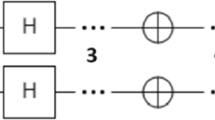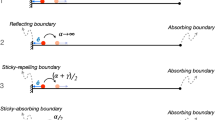Abstract
Rare events such as nucleation processes are of ubiquitous importance in real systems. The most popular method for nonequilibrium systems, forward flux sampling (FFS), samples rare events by using interfaces to partition the whole transition process into sequence of steps along an order parameter connecting the initial and final states. FFS usually suffers from two main difficulties: low computational efficiency due to bad interface locations and even being not applicable when trapping into unknown intermediate metastable states. In the present work, we propose an approach to overcome these difficulties, by self-adaptively locating the interfaces on the fly in an optimized manner. Contrary to the conventional FFS which set the interfaces with equal distance of the order parameter, our approach determines the interfaces with equal transition probability which is shown to satisfy the optimization condition. This is done by firstly running long local trajectories starting from the current interface λ i to get the conditional probability distribution P c (λ > λ i |λ i ), and then determining λ i+1 by equaling P c ( λ i+1|λ i ) to a give value p 0. With these optimized interfaces, FFS can be run in a much more efficient way. In addition, our approach can conveniently find the intermediate metastable states by monitoring some special long trajectories that neither end at the initial state nor reach the next interface, the number of which will increase sharply from zero if such metastable states are encountered. We apply our approach to a two-state model system and a two-dimensional lattice gas Ising model. Our approach is shown to be much more efficient than the conventional FFS method without losing accuracy, and it can also well reproduce the two-step nucleation scenario of the Ising model with easy identification of the intermediate metastable state.
Similar content being viewed by others
References
Chandler D. Introduction to Modern Statistical Mechanics. New York: Oxford University Press, 1987
Frenkel D, Smit B. Understanding Molecular Simulation: From Algorithms to Applications. 2nd ed. Boston: Academic Press, 2002
Chandler D. Statistical mechanics of isomerization dynamics in liquids and the transition state approximation. J Chem Phys, 1978, 68: 2959–2970
Aderson JB. Predicting rare events in molecular dynamics. Adv Chem Phys, 1995, 91: 381–431
Crooks GE, Chandler D. Efficient transition path sampling for nonequilibrium stochastic dynamics. Phys Rev E, 2001, 64: 026109
Dellago C, Bolhuis PG, Csajka FS, Chandler D. Transition path sampling and the calculation of rate constants. J Chem Phys, 1998, 108: 1964–1977
Bolhuis PG, Chandler D, Dellago C, Geissler PL. Transition path sampling: Throwing ropes over rough mountain passes, in the dark. Annu Rev Phys Chem, 2002, 53: 291–318
var Erp TS, Moroni D, Bolhuis PG. A novel path sampling method for the calculation of rate constants. J Chem Phys, 2003, 118: 7762–7774
var Erp TS, Bolhuis PG. Elaborating transition interface sampling methods. J Comput Phys, 2005, 205: 157–181
Faradjian AK, Elber R. Computing time scales from reaction coordinates by milestoning. J Chem Phys, 2004, 120: 10880
Allen RJ, Warren PB, ten Wolde PR. Sampling rare switching events in biochemical networks. Phys Rev Lett, 2005, 94: 018104
Allen RJ, Frenkel D, ten Wolde PR. Simulating rare events in equilibrium or nonequilibrium stochastic systems. J Chem Phys, 2006, 124: 024102
Allen RJ, Valeriani C, ten Wolde PR. Forward flux sampling for rare event simulations. J Phys Condens Matter, 2009, 21: 463102
Page AJ, Sear RP. Heterogeneous nucleation in and out of pores. Phys Rev Lett, 2006, 97: 065701
Ghiringhelli LM, Valeriani C, Meijer EJ, Frenkel D. Local structure of liquid carbon controls diamond nucleation. Phys Rev Lett, 2007, 99: 055702
Li T, Donadio D, Galli G. Ice nucleation at the nanoscale probes no man’s land of water. Nat Commun, 2013, 4: 1887
Huang L, Makarov DE. The rate constant of polymer reversal inside a pore. J Chem Phys, 2008, 128: 114903
Hernandez-Ortiz JP, de Pablo JJ. Hydrodynamic effects on the translocation rate of a polymer through a narrow pore. J Chem Phys, 2009, 133: 044904
Borrero EE, Escobedo FA. Folding kinetics of a lattice protein via a forward flux sampling approach. J Chem Phys, 2006, 130: 225101
Velez-Vega C, Borrero EE, Escobedo FA. Kinetics and reaction coordinate for the isomerization of alanine dipeptide by a forward flux sampling protocol. J Chem Phys, 2009, 125: 164904
Borrero EE, Escobedo FA. Optimizing the sampling and staging for simulations of rare events via forward flux sampling schemes. J Chem Phys, 2008, 129: 024115
Maier RS, Stein DL. Effect of focusing and caustics on exit phenomena in systems lacking detailed balance. Phys Rev Lett, 1993, 71: 1783–1786
Author information
Authors and Affiliations
Corresponding author
Rights and permissions
About this article
Cite this article
Jiang, H., Pu, M. & Hou, Z. An efficient self-optimized sampling method for rare events in nonequilibrium systems. Sci. China Chem. 57, 165–171 (2014). https://doi.org/10.1007/s11426-013-5009-3
Received:
Accepted:
Published:
Issue Date:
DOI: https://doi.org/10.1007/s11426-013-5009-3




